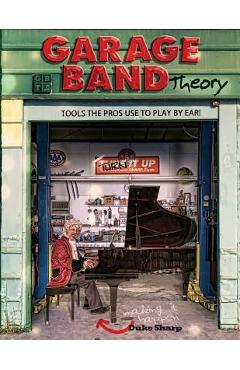Garage Band Theory: music theory-learn to read & play by ear, tab & notation for guitar, mandolin, banjo, ukulele, piano, beginner & advan - Duke Sharp

Detalii Garage Band Theory: music theory-learn
Vânzător
libris.ro
Pret
195.3 Lei
195.3 Lei
217 Lei
Categorie (vânzător)
Juvenile Nonfiction
Marca
Duke Sharp
Descriere YEO:
Descriere magazin:
This is non Academic, practical, useful theory for living-room pickers and working musicians who want to be able to think coherently about music in order to ask questions and understand answers about the music they want to play. The stuff in GBT is about understanding The Beatles and The Rolling Stones, Cole Porter and Duke Ellington, The Grateful Dead and Vampire Weekend. It\'s NOT about analyzing Bach Fugues. It was written for the 99% of musicians who are NOT music majors by a incorrigible honky-tonk guitar player who plays by ear ... but understands the relevant vocabulary and what\'s sensible and useful for MOST players. Garage Band Theory is a must for any musician. Rodney Crowell Don\'t be put off by this giant book - Duke\'s got the secrets of the universe in here. Quite simply, this is the most comprehensive book on music theory I\'ve ever seen. Bill Payne (Little Feat) Something for every musician at any level. Especially helpful is the musical notation and tablature for a variety of instruments. This book inspires me to learn and practice more. Sam Bush Garage Band Theory is a veritable encyclopedia of useful tools and tips.This book lifts the lid off the black box of music theory and let\'s the light shine in - and in a fun, practical way. This is a book which should be left handily lying around the living room, bedside, studio, classroom, (restroom?) - ready to be dipped into at any time for reference purposes or just to improve or refresh one\'s fluency in the language of music. A great resource for musicians young and old no matter what your training. For the price of a one-hour lesson, GBT offers a lifetime of learning. Alasdair Fraser Garage Band Theory let me know how little I know... but in a good way. It\'s a great book Sterling C Ball CEO, Ernie Ball Inc. This book is written in the people\'s key. Kostas Garage Band Theory offers you everything you need to know to understand, play and make your own music. Because he is both an accomplished musician and teacher, Sharp\'s Garage Band Theory is an excellent guide for beginners and more advanced players alike. Sam Barry, author, musician

Garage Band Theory: music theory-learn - Disponibil la libris.ro
Pe YEO găsești Garage Band Theory: music theory-learn de la Duke Sharp, în categoria Juvenile Nonfiction.
Indiferent de nevoile tale, Garage Band Theory: music theory-learn to read & play by ear, tab & notation for guitar, mandolin, banjo, ukulele, piano, beginner & advan - Duke Sharp din categoria Juvenile Nonfiction îți poate aduce un echilibru perfect între calitate și preț, cu avantaje practice și moderne.
Preț: 195.3 Lei
Caracteristicile produsului Garage Band Theory: music theory-learn
- Brand: Duke Sharp
- Categoria: Juvenile Nonfiction
- Magazin: libris.ro
- Ultima actualizare: 05-06-2025 16:21:01
Comandă Garage Band Theory: music theory-learn Online, Simplu și Rapid
Prin intermediul platformei YEO, poți comanda Garage Band Theory: music theory-learn de la libris.ro rapid și în siguranță. Bucură-te de o experiență de cumpărături online optimizată și descoperă cele mai bune oferte actualizate constant.
Descriere magazin:
This is non Academic, practical, useful theory for living-room pickers and working musicians who want to be able to think coherently about music in order to ask questions and understand answers about the music they want to play. The stuff in GBT is about understanding The Beatles and The Rolling Stones, Cole Porter and Duke Ellington, The Grateful Dead and Vampire Weekend. It\'s NOT about analyzing Bach Fugues. It was written for the 99% of musicians who are NOT music majors by a incorrigible honky-tonk guitar player who plays by ear ... but understands the relevant vocabulary and what\'s sensible and useful for MOST players. Garage Band Theory is a must for any musician. Rodney Crowell Don\'t be put off by this giant book - Duke\'s got the secrets of the universe in here. Quite simply, this is the most comprehensive book on music theory I\'ve ever seen. Bill Payne (Little Feat) Something for every musician at any level. Especially helpful is the musical notation and tablature for a variety of instruments. This book inspires me to learn and practice more. Sam Bush Garage Band Theory is a veritable encyclopedia of useful tools and tips.This book lifts the lid off the black box of music theory and let\'s the light shine in - and in a fun, practical way. This is a book which should be left handily lying around the living room, bedside, studio, classroom, (restroom?) - ready to be dipped into at any time for reference purposes or just to improve or refresh one\'s fluency in the language of music. A great resource for musicians young and old no matter what your training. For the price of a one-hour lesson, GBT offers a lifetime of learning. Alasdair Fraser Garage Band Theory let me know how little I know... but in a good way. It\'s a great book Sterling C Ball CEO, Ernie Ball Inc. This book is written in the people\'s key. Kostas Garage Band Theory offers you everything you need to know to understand, play and make your own music. Because he is both an accomplished musician and teacher, Sharp\'s Garage Band Theory is an excellent guide for beginners and more advanced players alike. Sam Barry, author, musician
